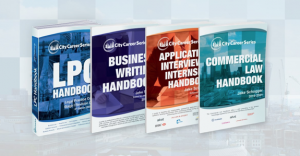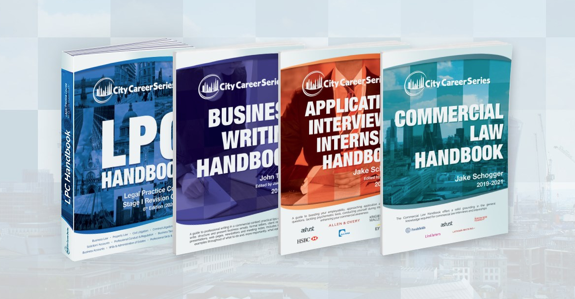
What Is The Cheapest Way To Get A Divorce
September 7, 2020
What Accidents Are Included In A Personal Injury Case
September 9, 2020In this article, Meagan Leightley interviews Jake Schogger, qualified lawyer and author of the well-known City Career Series which offers a comprehensive range of resources directly relevant to the recruitment process for a wide variety of City careers. In this interview, Jake shares some insight into his journey and how he has transitioned to an entrepreneur with an exciting release coming up soon!
Could you tell us a bit about yourself and why you chose to enter the legal profession?
I’m a qualified lawyer, entrepreneur, author, copywriter and consultant. After completing my degree and the Legal Practice Course, I trained at City law firm, Freshfields Bruckhaus Deringer, before leaving the City to focus on advising start-ups and scale-ups on a range of commercial, employment and fundraising matters.
Whilst still at university, I founded City Career Series, a publishing company that has sold approximately 50,000 handbooks designed to help students secure City careers. I also now run a consultancy called Fresh Perspective (through which I work closely with high growth enterprises on a range of creative and commercial projects) and a luxury bespoke cake business.
My interest in law initially stemmed from my experience at a law firm’s offices whilst being taken through a record deal that my friends and I had been offered back when we were 18 (I remember thinking that the lawyer’s job seemed pretty interesting and people focused). I then chose to study law and business, on the basis that I had really enjoyed business A-level but wanted to mix it up a bit. During freshers’, I went to so many different employer presentations (they were a great source of free food and drink) and ended up finding the law firms’ presentations the most interesting. I liked the commercial aspects, the focus on team working and the idea of using language to mitigate risk, so I decided to apply for open days and vacation schemes. The rest is history…
What made you want to make the transition from working at a Magic Circle Law firm to working as a legal advisor for start-ups and becoming a career coach?
I learned a great deal on my training contract and was lucky enough to work with some really great people. However, by the end of my training I had realised that my own priorities and professional interests didn’t align closely enough with a career in the City.
Firstly, I decided I wanted more control over my time, a priority that was especially important to me given that my son had just been born. Ironically, I now work longer hours than I ever did in the City, but I like the fact that I have the flexibility to work from home and can guarantee time off when I really need it. I also have far greater oversight over my current and future work-related responsibilities, which makes it easier to plan ahead.
Secondly, I had identified “impact” as another important priority and had discovered that working on deals that made the front page of the Financial Times wasn’t the kind of impact I was after. I wanted to work in a context that enabled me to see first-hand how my personal contributions made a real difference for clients, which is what eventually led to me working for Ignition Law. Through Ignition Law, I work directly with founders of exciting start-ups and scale-ups and run my own workstreams, which makes it easier for me to gauge how my advice and support is contributing to the growth and success of my clients. One of these clients actually subsequently hired me in a commercial/creative capacity and I’ve now been on their journey for over 18 months. It has been quite a ride!
In terms of career coaching, throughout my latter university days, I used to mentor hundreds of students, which involved delivering CV and interview workshops on a weekly basis. I really enjoyed the challenge of helping people to understand and articulate their motivations, skills and strengths, and being able to combine this with the insights I picked up throughout my internships and training contract meant that career coaching offered a highly appealing next step.
Could you tell us a bit about the Career Series guides you have written and what inspired you to write them?
City Career Series offers a comprehensive range of resources directly relevant to the recruitment process for a wide variety of City careers. These resources have been designed and collated to assist students and graduates right the way through their pursuit of a City career, whether they are just starting out, working on applications, preparing for interviews, gearing up to undertake internships or preparing for the world of work.
My contributors and I progressed successfully through the graduate recruitment process and secured careers at a range of top City firms across different industries, having collectively attended 100+ interviews and internships. This helps to ensure that the information provided is comprehensive, concise, easy-to-understand and reflective of City firms’ current requirements and expectations of candidates. Our most popular publication – the Commercial Law Handbook – offers a solid grounding in the legal, commercial and financial knowledge required for commercial law interviews and internships, including explanations of the key terminology and jargon.
My inspiration for writing the handbooks came from my experiences running mock interview workshops at university. Students were clearly concerned about the commercial awareness elements of interviews, so I put together a guide based on all the notes I had taken during countless open days, firm presentations and commercial awareness-related events. I gave this out for free to members of a society I had co-founded, and the positive feedback I received encouraged me to develop a far more comprehensive version, based on all the commercial topics I had covered throughout my own interviews. And so, the first proper edition of the Commercial Law Handbook was born.
Students are always being told to be commercially aware, what would you recommend students to do to ensure they’re commercially aware?
I recently considered this topic when working on the latest edition of my “Commercial Law Handbook”, so I thought I’d quote some of the advice I provide in there.
Trying to “cram” commercial awareness right before an interview isn’t an ideal approach, as you’ll likely only pick up a shallow understanding of the commercial topics that you read about. If your understanding is shallow, you’ll also likely have little interest in what you’re reading about and discussing, which won’t come across well during an interview.
Think about the first few pages of a dense novel. It’s harder to maintain your interest at the start, as you don’t yet understand the context or the history of the characters. It’s the history and the development that draw you in, meaning stories tend to become far more gripping once you start to understand how the sections you are reading fit into the broader context of the book. It’s the same with commercial awareness. News stories and commercial concepts are generally uninteresting in isolation, but once you start to understand how it all fits together – and the impact this can have on firms, clients and industries – you’ll likely find it all a lot more interesting and become more confident talking about it in interviews.
It’s better to get into the habit of building your commercial awareness on a regular basis, and even 5 minutes per day can make all the difference. Signing up to news digests can help to get you in the habit of digesting the news in bite-sized chunks. I strongly recommend subscribing to The Economist’s free weekly digest email, as this succinctly summarises 8 – 12 of the key news stories from around the world. If you’re interested in tech and the investment landscape, I would also strongly recommend the free weekly digests available from CB Insights and AngelList and I’m sure there are countless other digests covering the full spectrum of business-related news. Each of these digest emails takes only a few minutes to read, but over time they can help you to build a comprehensive picture of what’s going on in the world without feeling like you’re committing hours and hours to developing your commercial awareness.
There are also so many books available to help you build your knowledge of commercial, financial and legal concepts. I personally used Christopher Stoakes’ book “All You Need To Know About The City” when preparing for my interviews, and I can’t recommend it enough. Also, as mentioned, my handbooks provide a solid grounding in the technical concepts that you may be required to understand and apply when tackling commercial awareness interviews and case studies.
However, one of my favourite ways of learning about how businesses operate is by reading books about the history of well-known businesses and founder biographies. I particularly enjoyed “The Upstarts” by Brad Stone, which charts the entrepreneurial journeys of Uber and Airbnb, from the early days of knocking on doors and absorbing rejection after rejection, right through to them joining the realm of tech superstars.
You have an incredible presence on LinkedIn, what advice would you give to students beginning their LinkedIn journey?
People have written entire books on LinkedIn so there’s clearly a huge amount of advice to bear in mind. The most important thing to bear in mind is that your LinkedIn profile is public and accessible 24/7 from all over the world. In that sense, having a LinkedIn profile is a little like sending out your CV to everyone in your network, every second of every day. It is also becoming increasingly common for interviewers to have a quick skim of candidates’ LinkedIn profiles before an interview and for supervisors to have a cheeky skim before you start an internship or graduate role.
With this in mind, ask yourself the following: would you send your CV to everyone you know – and future interviewers and supervisors – without first ensuring it’s up to date, it’s accurate and it positively reflects your abilities and experiences? The right answer is, of course, “no”, but many people don’t think about LinkedIn in the same way.
In short, LinkedIn should reflect what you’ve done, what you’re currently doing, what you’re good at and what you’re looking for. It should highlight all your relevant experiences and draw out your key skills and achievements. Just like a CV.
For starters, make sure that your LinkedIn profile is free from spelling and grammatical errors and ensure that your photograph is recent and professional (no photos from Ayia Napa 2019, this isn’t Facebook!). Remember, for people you haven’t met before, your profile will provide their first impression of you. You should get in the habit of adding every new experience that you complete, as soon as you complete it. If you have attended a virtual internship or an office visit, stick it on there, including the firm name(s), what you did and what you got out of it. Include your positions of responsibility (including roles on university society executive committees) and feel free to throw in a few interests and extracurricular activities to show that you’re a well-rounded individual.
You can also post about your successes (e.g. receiving an award), what you’re up to (e.g. attending webinars or launching an enterprise), what you’re offering (e.g. volunteering to write articles or carry out work experience relevant to the career you’re pursuing) and the like. In addition, you could post key takeaways from the events, webinars or workshops you have attended. This can all show that you use your initiative, you’re proactive and a self-starter, you’re engaged, you’re constantly looking to learn and progress, and that you’re genuinely interested in a particular topic or industry.
Do you have anything exciting in the pipeline?
City Career Series will soon be releasing a brand-new Training Contract Handbook (hopefully in early October 2020). This will include expert contributions from dozens of trainees and associates from a range of market-leading City firms, plus comprehensive insights and insider tips from leading City trainers, authors and academics. I’ve been working on this for four years and am so excited that it’s almost ready for release. To give a little preview, the book will include:
- A comprehensive insight into what trainees do, including practice area overviews and example trainee work-logs.
- Insider tips on managing your workload, interacting with supervisors and demonstrating initiative.
- Expert guidance on how to effectively approach research, presentations, proofreading and written tasks.
- A refresher of foundational commercial and contract law concepts.
- Advice on how to project manage the M&A process, including complex due diligence exercises and signings and completions.
- A detailed explanation of some of the key transaction documents, including sale and purchase agreements, shareholders’ agreements and loan agreements.
- Advice on how to coordinate the litigation process, including document reviews.
- A practical guide to Microsoft Word, Microsoft Outlook and Microsoft Excel.
- Explanations of hundreds of key legal concepts and contractual clauses, including the terminology, jargon and acronyms.
For more information, visit: www.citycareerseries.com, join Jake’s dedicated LinkedIn group for aspiring commercial lawyers (www.linkedin.com/groups/8944518) and search for “City Career Series” on YouTube, LinkedIn and Instagram. All the books are available through the City Career Series website and Amazon.co.uk.






